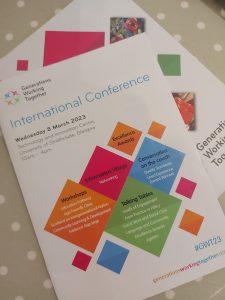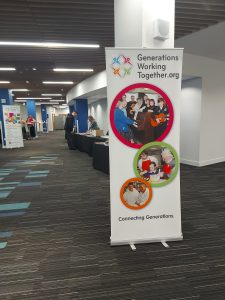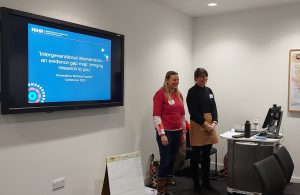A research team have travelled to the Generations Working Together International conference to deliver a workshop on their newly published evidence and gap map of intergenerational activity.
The map, produced as part of the Intergenerational practices and intergenerational learning in health and social care (iGEN) study to help address global ageism, sets out to identify and collect all the available evidence on the use of intergenerational activities.
Bringing people of different ages together
Intergenerational activities are seen as a positive way to bring people of different ages together to help increase understanding and integration, an issue which is becoming increasingly important as the way that we live and work changes and opportunities for social connection between generations in the UK continues to decrease.
‘Of people aged 16 to 24, 11% were significantly more likely to report feeling lonely often or always and at the same time 9 % of people aged 65 years and over reported the same.’
In a report on their research the team say, ‘The Office for National Statistics Community Life Survey 2020-2021 reports that 6% of adults in the UK said they often or always felt lonely. Of people aged 16 to 24, 11% were significantly more likely to report feeling lonely often or always, and at the same time 9 % of people aged 65 years and over reported the same.’
Identifying the evidence
By identifying all the available evidence, the team hoped to develop an understanding of what impact intergenerational activities might have on the health and wellbeing of older and younger people and issues such as loneliness, an understanding which could help to shape future research and inform decisions made by policy-makers about including intergenerational interventions in health and social care services. The resulting evidence and gap map will help researchers and decision makers to access the available research.
intergenerational activities might have on the health and wellbeing of older and younger people and issues such as loneliness, an understanding which could help to shape future research and inform decisions made by policy-makers about including intergenerational interventions in health and social care services. The resulting evidence and gap map will help researchers and decision makers to access the available research.
The iGEN research team, a collaboration including our Evidence Synthesis Team, researchers from the Universities of Exeter, Sheffield, Newcastle and Oxford and NHS services, analysed information from 500 research articles, 26 systematic reviews, 236 quantitative comparative studies, 227 qualitative studies, 105 observational studies and 82 with a mixed-methods approach from 27 countries.
Sharing the findings
 Professor Jo Thompson Coon said: “We were delighted to be invited to the conference in Glasgow to present our findings and share the map with a wider audience. We’d really like the map to be useful to and used by practitioners. We feel privileged to have had the opportunity to share our work, to learn from the leaders in the field of intergenerational practice and to have made links with so many fascinating people and projects. It’s been a valuable exercise in learning about the importance of partnerships, relationships, and connections.”
Professor Jo Thompson Coon said: “We were delighted to be invited to the conference in Glasgow to present our findings and share the map with a wider audience. We’d really like the map to be useful to and used by practitioners. We feel privileged to have had the opportunity to share our work, to learn from the leaders in the field of intergenerational practice and to have made links with so many fascinating people and projects. It’s been a valuable exercise in learning about the importance of partnerships, relationships, and connections.”
Research Fellow Rebecca Whear, who presented the workshop with Fiona Campbell, colleague, and collaborator from Sheffield University, said: “We were bowled over by the response, we couldn’t have encountered a more receptive, effusive reaction to our work. We’re so grateful to all the workshop attendees for their generous comments and enthusiasm and are really encouraged to hear that our map has filled a gap.”
Showcasing approaches and impacts
Attendees at the conference included practitioners, volunteers, school children, community representatives, academics and organisations such as Age Scotland, Trellis and Yellow Door as well as international organisations such as Generations United and Linking Generations. Excellence Awards for intergenerational practice were presented for categories including ‘Tackling Age Discrimination and Stereotypes’, ‘Valuing Generational Diversity’, and ‘Building on Wider Knowledge’. A diversity of approaches and impacts on individuals of intergenerational activities were showcased at the conference, from gardening to boat building to youth work.
as international organisations such as Generations United and Linking Generations. Excellence Awards for intergenerational practice were presented for categories including ‘Tackling Age Discrimination and Stereotypes’, ‘Valuing Generational Diversity’, and ‘Building on Wider Knowledge’. A diversity of approaches and impacts on individuals of intergenerational activities were showcased at the conference, from gardening to boat building to youth work.
Learning more
 If you missed the workshop and would like to learn more about the map the team are hoping to share some short videos during Global Intergenerational Week on 24th to 30th April. Meanwhile you can look at the map and accompanying report and share your thoughts with the team.
If you missed the workshop and would like to learn more about the map the team are hoping to share some short videos during Global Intergenerational Week on 24th to 30th April. Meanwhile you can look at the map and accompanying report and share your thoughts with the team.
The team are already thinking about possibilities for future collaboration and plan to update the map over the coming year. They want to hear from you with any studies to include or if you think your organisation might be interested in sharing a link to the map from your website.
